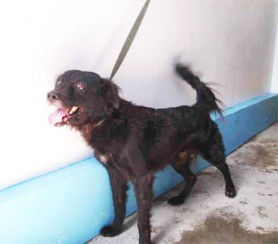 Pet Corner -Nasal solar dermatitis
Pet Corner -Nasal solar dermatitis
This fancy name is also called ‘Collie nose’ since it occurs with some frequency in the Collie, the Scottish Sheepdog (‘Lassie’ of television and movie fame is a Collie). This condition is really an eczema of the nose bridge. Since the eczema has its focus on the unpigmented skin of the nose, especially in summer and in warm climates, it is thought to be connected with the sun’s rays (hypersensitivity to the ultraviolet rays?). I think that the jury is still out relative to the true cause (or complex of causes) associated with this ailment. For example, here in Guyana where we are, by and large, in a perpetual summer – being 5° away from the equator and where we experience perennially high humidity levels, one would expect this nasal solar dermatitis to be ubiquitous – especially in white-coated dogs. This is, however, not the case. Consequently, I think that scientists need to search further and delve more deeply to find the true factor(s) which can precipitate this condition.
Symptoms

At the onset, there is reddening of the skin which is then followed by hair loss. As the condition worsens, serum oozes out of the nasal skin (‘weeping’ eczema). A crust is formed, s econdary infection compounds the problem and later a full-fledged ulcer develops. In fact, in the worst case scenario, pieces of the nose bridge decompose and fall off. Bleeding occurs at the touch and cancerous tissue may develop.
Treatment
This ailment is quite distinct from a fungal, viral or parasitic infection. As a result, the immediate therapy is to move the dog out of our fierce sunlight. Your vet will prescribe, as he/she sees fit, antibiotics and anti-inflammatory steroids. One of the prophylactic measures we used to use in Collies in Europe was tattooing the nose bridge with a black pigment, I suppose topical sunscreen lotions and ointments can be used as part of the therapeutic arsenal.
Vitiligo
Yes, believe it or not, dogs can acquire Vitiligo as well. You may have seen humans with this condition for which there seems to be no cure, even though several ointments, lotions, diets, etc, purport to cure the ailment. A friend of mine concocts a rye grass soup and drinks the stuff. I don’t see that it helps. In fact, whenever one doesn’t know the cause of a sickness, it is then particularly difficult to cure that ailment.
Symptoms
Cats’ vitiligo seems to be a pigmentary abnormality which is either acquired or familial – the latter meaning that certain breeds of dogs (eg Belgian Tervuren, Rottweilers)/cats (eg Siamese cats) are predisposed to develop vitiligo. Animals with this malady develop a symmetric (on both sides of the nose bridge) depigmentation of the skin on the nose and elsewhere (around the eyes, muzzle, and claws for example).
The onset is usually in young adulthood. The depigmentation comes on with some severity and then wanes (up to the point of complete remission).
In dogs, the pigment loss is gradual and it can incorporate portions of the lip as well. One good thing is that in some cases, as mentioned above, the dog recovers the pigmentation in spite of (not because of) veterinary intervention.
There is no genuine treatment. ‘Successful’ medication against this disease in humans has no effect on animals.
Allergic dermatitis
Some people call this malady ‘Plastic dish nasal dermatitis’ simply because the nasal skin develops the problem when the dog/pup eats from a plastic or rubber dish. It seems that the skin of the lips and nose becomes extra-sensitive to certain chemical compounds found in these synthetic dishes, and irritation and inflammation follow. The condition goes away once the feeding bowls are changed, preferably to a stainless steel container (ware and glass dishes tend to break too easily). One could also introduce, under vet advice, anti-allergy medication as part of the treatment regime.
Enjoy the week; Happy Emancipation Day!
Please implement disease preventative measures (vaccinations, routine dewormings, monthly anti-heartworm medication, etc) and adopt-a-pet from the GSPCA’s Animal Clinic and Shelter at Robb Street and Orange Walk, if you have the wherewithal to care well for the animals. Do not stray your unwanted pets, take them to the GSPCA’s Clinic and Shelter instead. If you do not wish your pet to have puppies or kittens, you may exploit the GSPCA’s free spay and neutering programme. If you see anyone being cruel to an animal, or if you need any technical information, please get in touch with the Clinic and Shelter by calling 226-4237.

